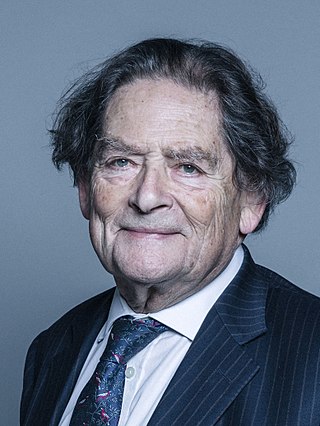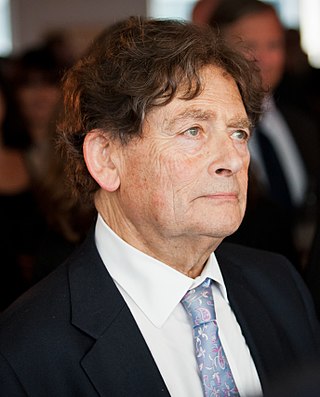
Nigel Lawson, Baron Lawson of Blaby, was a British politician and journalist. A member of the Conservative Party, he served as Member of Parliament for Blaby from 1974 to 1992, and served in Margaret Thatcher's Cabinet from 1981 to 1989. Prior to entering the Cabinet, he served as the Financial Secretary to the Treasury from May 1979 until his promotion to Secretary of State for Energy. He was appointed Chancellor of the Exchequer in June 1983 and served until his resignation in October 1989. In both Cabinet posts, Lawson was a key proponent of Thatcher's policies of privatisation of several key industries.

Norman Stewart Hughson Lamont, Baron Lamont of Lerwick, is a British politician and former Conservative MP for Kingston-upon-Thames. He served as Chancellor of the Exchequer from 1990 until 1993. He was created a life peer in 1998. Lamont was a supporter of the Eurosceptic organisation Leave Means Leave.
A tax cut typically represents a decrease in the amount of money taken from taxpayers to go towards government revenue. This decreases the revenue of the government and increases the disposable income of taxpayers. Tax rate cuts usually refer to reductions in the percentage of tax paid on income, goods and services. As they leave consumers with more disposable income, tax cuts are an example of an expansionary fiscal policy. Tax cuts also include reduction in tax in other ways, such as tax credit, deductions and loopholes.

In the United Kingdom, taxation may involve payments to at least three different levels of government: central government, devolved governments and local government. Central government revenues come primarily from income tax, National Insurance contributions, value added tax, corporation tax and fuel duty. Local government revenues come primarily from grants from central government funds, business rates in England, Council Tax and increasingly from fees and charges such as those for on-street parking. In the fiscal year 2023–24, total government revenue was forecast to be £1,139.1 billion, or 40.9 per cent of GDP, with income taxes and National Insurance contributions standing at around £470 billion.
Buy-to-let is a British phrase referring to the purchase of a property specifically to let out, that is to rent it out. A buy-to-let mortgage is a mortgage loan specifically designed for this purpose. Buy-to-let properties are usually residential but the term also encompasses student property investments and hotel room investments.
Mortgage interest relief at source, or MIRAS, was a housing tax relief scheme in the United Kingdom from 1983 to 2000, which was introduced as a way of reducing the amount of tax relief granted to mortgage borrowers.

The Lawson Boom was the macroeconomic conditions prevailing in the United Kingdom at the end of the 1980s, which became associated with the policies of Margaret Thatcher's Chancellor of the Exchequer, Nigel Lawson.

The 2012 United Kingdom budget was delivered by George Osborne, the Chancellor of the Exchequer, to the House of Commons on Wednesday 21 March 2012.

The American Taxpayer Relief Act of 2012 (ATRA) was enacted and passed by the United States Congress on January 1, 2013, and was signed into law by US President Barack Obama the next day. ATRA gave permanence to the lower rates of much of the "Bush tax cuts".

Capital gains tax in the United Kingdom is a tax levied on capital gains, the profit realised on the sale of a non-inventory asset by an individual or trust in the United Kingdom. The most common capital gains are realised from the sale of shares, bonds, precious metals, real estate, and property, so the tax principally targets business owners, investors and employee share scheme participants.

The June 1979 United Kingdom budget was delivered by Geoffrey Howe, the Chancellor of the Exchequer, to the House of Commons on 12 June 1979. It was Howe's first budget and the first of the first Thatcher ministry, which had been elected a few weeks earlier. It was also the second budget to be delivered to Parliament in 1979. The budget marked a major change in direction for the UK economy, with an increase in reliance on interest rates and monetary policy to control inflation. It is also noted for its introduction of substantial tax cuts, such as reducing the top rate of income tax from 83% to 60% and the basic rate from 33% to 30%. The budget also saw an increase in VAT from 8% to 15%.

The 1989 United Kingdom budget was delivered by Nigel Lawson, the Chancellor of the Exchequer, to the House of Commons on 14 March 1989. It was the sixth and final budget to be presented by Lawson during his tenure as Chancellor, and took a much more cautious approach to the UK economy than previous budgets delivered by Lawson. It was outlined against the back drop of mounting economic turbulence with increasing interest rates and rising inflation. 1989 was also the final pre-television era budget to be presented to the House of Commons.

The 1997 United Kingdom budget was delivered by Gordon Brown, the Chancellor of the Exchequer, to the House of Commons on 2 July 1997. It was the first budget to be presented by Brown during his tenure as Chancellor, and the first Labour budget to be presented since April 1979. The 1997 budget marked a significant change of direction in economic policy following Labour's election win in May 1997. Among the measures announced were a five-year plan to reduce the budget deficit, a £5.2bn windfall tax on recently privatised utilities which was to fund Labour's planned Welfare to Work scheme, and a reduction in VAT on fuel. The budget was welcomed by business, which viewed it as fiscally responsible, but it was greeted less warmly by the UK's utility providers.

The 1998 United Kingdom budget was delivered by Gordon Brown, the Chancellor of the Exchequer, to the House of Commons on 17 March 1998. It was the second budget to be presented by Brown following Labour's 1997 general election win, and sought to maintain the broad public support given to Labour in 1997 by announcing measures that would appeal to those who had voted the party into office. One of the key features of the 1998 budget was the Working Families Tax Credit, a benefit that could be claimed by families on low income. Brown also announced tax cuts for businesses, the launch of a £50m rural transport fund, and committed to taxing child benefit at a future date.

The 1996 United Kingdom budget was delivered by Kenneth Clarke, the Chancellor of the Exchequer, to the House of Commons on 26 November 1996. It was Clarke's fourth budget, the last to be delivered during his tenure as chancellor, the last budget to be presented by the Conservative government of John Major before the party was defeated by Labour in the 1997 general election, and it was the last fully Conservative budget until July 2015. Prior to Clarke's budget statement being presented to the House of Commons, its contents were leaked to the Daily Mirror, which returned the document to the government but decided to print some of the details, thus helping Tony Blair, then the leader of the Opposition, to prepare his response. Clarke described his statement as one that outlined a "Rolls-Royce recovery – built to last" and predicted economic growth of 2.5% for 1997 and 3.5% for 1998, but Blair dismissed it as "a last-gasp budget of a government whose time is up".

The 1995 United Kingdom budget was delivered by Kenneth Clarke, the Chancellor of the Exchequer, to the House of Commons on 28 November 1995. It was Clarke's third budget, and one of the shortest budget speeches in modern history. In his statement, Clarke reduced the middle rate of income tax by 1p to 24p, and after announcing that his spending reductions for the previous year had exceeded expectations by more than £3bn, announced plans to increase spending on healthcare, education and policing. His budget was criticised by members of the Conservative Party for not including more tax cuts, while Shadow Chancellor Gordon Brown of the Labour Party dismissed it as "the 7p up, 1p down budget".

The 1994 United Kingdom budget was delivered by Kenneth Clarke, the Chancellor of the Exchequer, to the House of Commons on 29 November 1994. It was the second budget to be presented by Clarke since his appointment as chancellor the previous year, and its central focus was a planned £24bn worth of tax cuts. Clarke also renewed his commitment to increasing Value Added Tax (VAT) on fuel, but pledged to soften the impact this would have on pensioners. The statement took place shortly after the Party Whip had been withdrawn from eight Conservative backbenchers, leaving the government without a working majority, and amid questions about the future of John Major's leadership of the party. In response to the budget, Tony Blair, leader of the Labour Party, said it would be remembered as the "VAT on fuel budget".

The 1987 United Kingdom budget was delivered by Nigel Lawson, the Chancellor of the Exchequer, to the House of Commons on 17 March 1987. It was the fourth budget to be presented by Lawson, and saw him announce tax cuts worth £2.6bn. He also forecast a £3bn reduction in government borrowing. Among his announcements were a reduction in the basic rate of income tax from 29% to 27%, and a reduction in Corporation Tax from 29% to 27%. The budget took place three months before the 1987 general election, which the Conservatives won. Neil Kinnock, leader of the Opposition Labour Party described it as a "bribes budget".

The 1986 United Kingdom budget was delivered by Nigel Lawson, the Chancellor of the Exchequer, to the House of Commons on 18 March 1986. It was the third budget to be presented by Lawson, and saw the start of a programme of tax cuts initiated under the leadership of Conservative Prime Minister Margaret Thatcher. Lawson set the theme of his budget as "popular capitalism" and stated his wish to turn a nation of homeowners into a nation of shareholders. As well as a cut in the basic rate of income tax from 30% to 29%, there were other changes to taxation. 1986 was also the year the chancellor announced the launch of the Personal equity plan (PEP), a tax-exempt plan that would allow ordinary members of the public to invest up to £2,400 a year in equities. Labour leader Neil Kinnock, the leader of the Opposition, dismissed the budget as a "bits and pieces budget" that promised "jam tomorrow".

The 1984 United Kingdom budget was delivered by Nigel Lawson, the Chancellor of the Exchequer, to the House of Commons on 13 March 1984. It was the first budget to be presented by Lawson, who had been appointed as chancellor after the 1983 general election, and saw him embark on "a radical programme of tax reform". These included a reduction in Corporation Tax and a cut in the higher rate of Transfer Tax and raised the Stamp Duty threshold.







